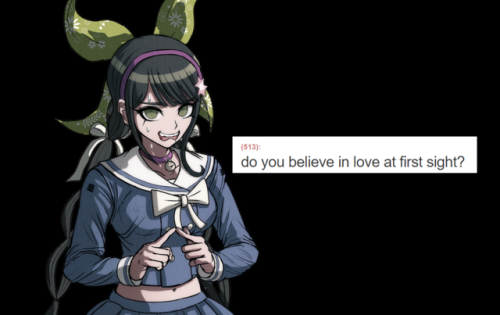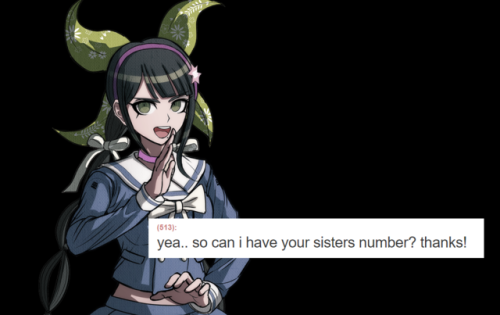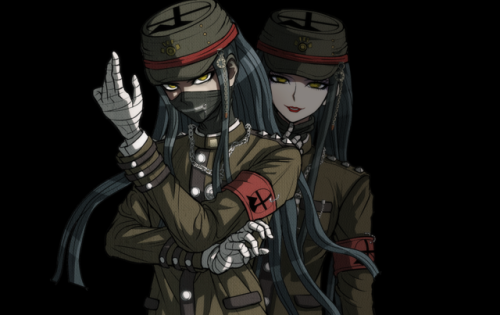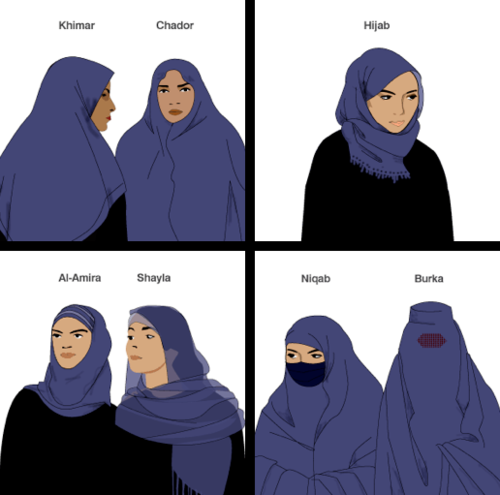Three Things You Must Know For Any Fight Scene
Three things you must know for any fight scene
I’m back with more advice! On today’s episode: fights. How to write them? How to plan them?
I’m here to help! Wether your a plotter, a pantser or somewhere in between, here are three things you should establish before writing a fight scene.
1) Who wins?
It seems like fairly obvious advice, but when I was a much younger writer, time after time, I’d go into a fight scene with no plan regarding the outcome. Whenever I felt like the fight was over, I’d end it, and whoever came out on top was the winner, regardless of how it made sense in the narrative.
Establishing a winner from the beginning allows you to build the fight up in a trajectory that makes sense. Once you know who wins, you can better choreograph the scene to keep readers guessing.
2) What are the stakes?
Once you know who wins, you must then decide what the stakes of the fight are. What happens if they lose? If they win? What is gained or lost? This can vary wildly, depending on what genre you’re in. Sci-fi and fantasy will commonly have world-ending stakes a la Avengers: Infinity War. Romance or contemporary stories are more on the ‘suspended from school’ end of the spectrum.
Either way, you must know what the fight accomplishes for the characters — good or bad. Not only must you know, but you must make sure it’s known for the reader too. If we don’t understand why the characters are fighting, the fight will be confusing and there will be little to no emotional tie.
3) What are the characters’ fighting styles?
This is more secondary information, but I think it’s important for at least the author to know. Ask yourself: Do my characters have previous fighting experience? Do they prefer one style to the other?
A boxer will fight differently from a wrestler. MMA and Karate do not look the same. If your characters have experience in any discipline, put some time towards researching it so you accurately portray it. Even non-combat sports can impact how someone fights.
If your characters have no fighting experience, they’re much more likely to be ‘scrappy.’ And no — someone with no combat background will not win against someone who does, unless they have untapped magic punching powers. Keep it realistic.
Once you’ve established these three things, you’re well on your way to writing a powerful fight that hooks readers in!
-
 heckcareoxytwit reblogged this · 1 year ago
heckcareoxytwit reblogged this · 1 year ago -
 m00nrune liked this · 1 year ago
m00nrune liked this · 1 year ago -
 yenoodlethings liked this · 2 years ago
yenoodlethings liked this · 2 years ago -
 heckcareoxytwit reblogged this · 2 years ago
heckcareoxytwit reblogged this · 2 years ago -
 oneoldriver reblogged this · 2 years ago
oneoldriver reblogged this · 2 years ago -
 outlandishethereals liked this · 2 years ago
outlandishethereals liked this · 2 years ago -
 empireroyals liked this · 2 years ago
empireroyals liked this · 2 years ago -
 shoheisehun liked this · 2 years ago
shoheisehun liked this · 2 years ago -
 vesper-roux reblogged this · 2 years ago
vesper-roux reblogged this · 2 years ago -
 vespenrot reblogged this · 2 years ago
vespenrot reblogged this · 2 years ago -
 vampirarts liked this · 2 years ago
vampirarts liked this · 2 years ago -
 arinbrayart liked this · 2 years ago
arinbrayart liked this · 2 years ago -
 blushingbelladonna liked this · 2 years ago
blushingbelladonna liked this · 2 years ago -
 hydrangeahelper liked this · 2 years ago
hydrangeahelper liked this · 2 years ago -
 deconstructiveflea liked this · 2 years ago
deconstructiveflea liked this · 2 years ago -
 popopodogrev reblogged this · 2 years ago
popopodogrev reblogged this · 2 years ago -
 lightningcupsea4fan reblogged this · 3 years ago
lightningcupsea4fan reblogged this · 3 years ago -
 lightningcupsea4fan liked this · 3 years ago
lightningcupsea4fan liked this · 3 years ago -
 aaustinwrites reblogged this · 3 years ago
aaustinwrites reblogged this · 3 years ago -
 sajefaire liked this · 3 years ago
sajefaire liked this · 3 years ago -
 katherine-knight liked this · 3 years ago
katherine-knight liked this · 3 years ago -
 zorlok-if liked this · 3 years ago
zorlok-if liked this · 3 years ago -
 manonamora-if reblogged this · 3 years ago
manonamora-if reblogged this · 3 years ago -
 felidaelogy reblogged this · 3 years ago
felidaelogy reblogged this · 3 years ago -
 montewave reblogged this · 3 years ago
montewave reblogged this · 3 years ago -
 bubonicbat reblogged this · 3 years ago
bubonicbat reblogged this · 3 years ago -
 felidaelogy liked this · 3 years ago
felidaelogy liked this · 3 years ago -
 strangelyxnormal-a reblogged this · 3 years ago
strangelyxnormal-a reblogged this · 3 years ago -
 labyriinths liked this · 3 years ago
labyriinths liked this · 3 years ago -
 ober-affen-geil liked this · 3 years ago
ober-affen-geil liked this · 3 years ago -
 accal1a reblogged this · 3 years ago
accal1a reblogged this · 3 years ago -
 v01dbug-s1nr0se liked this · 3 years ago
v01dbug-s1nr0se liked this · 3 years ago -
 write-now-right-now reblogged this · 3 years ago
write-now-right-now reblogged this · 3 years ago -
 batstickblog liked this · 3 years ago
batstickblog liked this · 3 years ago -
 oxymitch-archive reblogged this · 3 years ago
oxymitch-archive reblogged this · 3 years ago -
 silly-slacker-person liked this · 3 years ago
silly-slacker-person liked this · 3 years ago -
 raptorofwar liked this · 3 years ago
raptorofwar liked this · 3 years ago -
 narutosidebitch liked this · 3 years ago
narutosidebitch liked this · 3 years ago -
 tieukhannh liked this · 3 years ago
tieukhannh liked this · 3 years ago -
 loafingdragon liked this · 3 years ago
loafingdragon liked this · 3 years ago -
 meh-66 reblogged this · 3 years ago
meh-66 reblogged this · 3 years ago -
 meh-66 liked this · 3 years ago
meh-66 liked this · 3 years ago -
 chainsawcorazon reblogged this · 3 years ago
chainsawcorazon reblogged this · 3 years ago -
 callmebyrose reblogged this · 3 years ago
callmebyrose reblogged this · 3 years ago
More Posts from Blacklilly27
41 Emotions as Expressed through Body Language
Found Here x
41 Emotions as Expressed through Body Language unique This list, while exhausting, is soooo not exhaustive; it barely scratches the surface. And each entry could easily become cliché (if it isn’t already). But, it should be enough to get you started. Want more? Start watching people (not in a creepy way), and take notes of what they seem to do when expressing different emotions. Your repertoire of expression will double in no time. PS—do not use these for actual, real-life body language reading; you will fail. These are strictly novelistic.
Awed -Slack -jawed, raised eyebrows, staring -Frozen, slack body language (Self? What self? There is only Zuul.) -Take a step back and put a hand to his heart
Amused -Smiling and throwing back her head laughing -Slapping her thighs, stamping her feet, clapping her hands -Shaking her head (That’s so wrong!)
Angry/Aggressive -Sharp movements, like shaking a fist, pointing, slashing, or slamming a fist on a table -Flushed face, patchy red blotches -Tension in neck—chords standing out, veins throbbing—and jutting or tucked chin -Arms akimbo, or clenching fists -Entering someone else’s space and forcing them out -Poofing up with a wide stance (I am big! Very big!), arms wide (Bring it!) -Lowered eyebrows, squinting eyes -Teeth bared, jaw clenched, snarling
Annoyed -Pressing lips together into a thin line -Narrowing eyes sometimes with slight head tilt (Why do you still exist?) -Rolling eyes, often paired with a long-suffering sigh
Anxious -Fidgeting, such as tearing grass into little pieces, playing with a ring, or chewing on a pencil -Biting lower lip, swallowing unnecessarily -Quickened breathing or holding breath -Darting eyes -Pallor, sweating, clammy palms -Unusually high-pitched, “nervous” laughter -Hunched shoulders -Pacing
Attentive -Slow head nodding with a furrowed brow -Leaning forward, toward the speaker, and sitting up -Taking notes -Looking over the top of her glasses
Bored -Resting his head on his palm, peeking out between the fingers, maybe even slipping so his head “accidentally” hits the table -Tapping toes, twirling pencil, doodling, and otherwise fidgeting -Staring out a window, or at anything remotely more interesting (Which is everything …)
Confident -Arms clasped behind body -Head lifted, chest out, standing tall -Walking briskly and making firm, precise movements
Confused -Tilting head with narrowed eyes -A furrowed brow -Shrugging
Contempt/Superiority -Lifted chin (The better to look down the nose.) -Pursed lips, sneering, slight frown -Circling a shoulder, stretching her neck, turning away—anything to indicate she doesn’t see the person as a threat or worthy of her attention -Grabbing her lapels, or tucking her thumbs in her waistcoat (See this clothing? It is much nicer than yours.) -Dismissive hand-waving
Cynical/Sarcastic/Bitter -Twisted lips or a half-smile -Sneering, sometimes with shaking the head and other defensive body language -Pressed lips with a slight frown -Eye rolling
Defensive -Crossed arms, legs, crossed anything, really (Well, maybe not fingers … or eyes …) -Arms out, palms forward (Stop!) -Placing anything (sword, shield, book, backpack) in front of her body
Disgusted -Crinkling his nose -Curling his lip and/or showing the tip of his tongue briefly -Flinching back and interposing a shoulder or turning away -Covering his nose, gagging, and squinting his eyes shut—hard—for a moment. (It assaults all the senses.)
Displeased -A plastered-on fake smile (You suck; but I can’t tell you that. So here: a fake smile! Enjoy.) -Pouting or frowning (I’ll cry if you don’t give me what I want—don’t test me, I will!) -Crossed arms and other defensive/frustrated body language (I will not let that terrible idea influence me!)
Distressed -Wide eyes and shallow, rapid breathing -Beating the walls, or huddling into a corner -Clasping hands over his head protectively -Rocking himself -Handwringing -Running his hands through his hair
Earnest/Passionate -Leaning forward, nodding, wide eyes with strong eye contact and raised eyebrows -Hand on heart, or presented palms-up, or otherwise visible -A double-handed handshake (I really want to make sure you understand me!)
Embarrassment -Blushing -Stammering -Covering her face with her hands or bowing her head (I’m so embarrassed, I can’t look!) -Difficulty maintaining eye contact, looking down and away
Excited/Anticipation -Rubbing hands together (I can’t wait to get my hands on it!) -Licking lips (It’s so close I can taste it!) -A vigorous, pumping handshake (I can’t wait to get started!) -Jumping up and down (Look at me being literal here! I am jumping for joy.) -A wide and easy grin
Flirty -Eye play, like winking, looking up through the lashes, over the shoulder glances, and eye catching -Preening, like hair flipping or smooth, clothing straightening, spine straightening, etc. -Striking a cowboy pose, with his thumbs gripping his belt tight
Frustrated -Shaking his head (You are so wrong!) -Massaging temples (My brain—it hurts.) -Clasping his wrist in his opposite hand, behind his back (Bad arm! No biscuit.) -Running his hands through his hair (All this frustration is making my hair mussy. I can feel it.) -Grabbing onto something like armrests, or white-knuckled interdigitation (Restrain yourself!)
Happy -Smiling and laughing -Eyes and nose crinkling -Swinging her arms, spinning loosely, dancing, jumping
Impatience -Quick head nodding (Get on with it!) -Toe/finger tapping (Hear this? These are seconds. Wasted. Listening to you.) -Sighing, checking the clock/sundial/freckles (Time. It is moving so slowly.)
Jealous -Tight lips, or a sour expression -Narrow eyes locked on the perpetrator, to the point of a stare down -Crossed arms, and additional frustrated, angry, possessive, or bitter body language
Lying -Scratching their nose, ear, neck, miscellaneous part of face -Sudden change in behavior or demeanor, including shifty eye contact, lots of long blinking, shrugging -Ill-timed smiles or laughter (This is how I normally smile, right? Right???) -Additional anxiety body language -Shaking head no while saying “yes” (I can’t believe I just lied.) -Licking lips, covering mouth, touching mouth, etc.
Overwhelmed -Both palms to forehead, fingers splayed (This gives me a headache.) -Covering eyes with one hand (If I can’t see the world, it can’t see me …) -Eyes wide and staring into space, hands gripping the table in front of her (… Woah.)
Playful/Friendly -Winking -Waggling eyebrows -Tiny shoves or nudge
Pleasure -Head tilted back, lips parted slightly, eyes wide or closed -Slow, languorous movements, stretching (such as arching her neck or back) -Slight flush, quickened breath and pulse
Possessive -Handshake with arm clasp -Putting hands on or around someone’s shoulders, neck, waist, back, or even just the wall near them -Standing in someone’s personal space, body positioned toward that person -Any one-sided act of intimacy, like running a knuckle down someone’s cheek -Staring down any who get too close
Proud/Dominant -Chin up, chest out, shoulders back -A painfully hard handshake that not only squishes the bones, but also forces his hand on top -Leaning back with his hands behind his head, and his feet up -Strong, unblinking, focused eye contact
Reluctance/Resistance -Arms crossed, sometimes with fists (Not happening.) -Dragging feet (But I don’t wanna!) -Pinching nose (You want me to do what now?) -Clamping hands over ears (La la la la!)
Sad/Upset -Droopy body (and anything held, like a sword), bowed in shoulders, wrapping arms around self -Slow movements with hesitation -Bottom lip jutting out and/or quivering -Crying, sobbing, body shaking, sniffling, wet eyes
Secretive -A tight-lipped smile (My lips are zipped.) -Hiding her hands in her pockets (What has it got in its nasty little pocket?) -Looking away
Scared -Hunched shoulders, shrinking back from others (Don’t hurt me!) -Wide eyes and lifted eyebrows (The better to see them coming.) -Shaking, trembling, or freezing -Rocking from side to side, sometimes holding self (It’ll all be okay, self, it’ll all be okay.)
Shame -Slumped shoulders (Don’t look at me.) -Trouble meeting your gaze, looking down and away -Burying her face in her hands or bowing her head (I can’t face the world right now.)
Shocked -Hands covering her mouth, or mouth hanging open, sometimes with a gasp (If I had words, I would be saying them.) -Freezing and staring with wide eyes and eyebrows raised (Diverting all resources toward staring.) -Smacking a palm into his forehead (Clearly, my head isn’t working right, or I wouldn’t have seen that)
Shy -Avoids eye contact, or has only fleeting eye contact (Eye contact means you might speak to me.) -Keeps a fair distance from everyone, and will back away if someone steps closer (Space invaders!) -Folded arms, head down, and other defensive body language (If I make myself small, they can’t see me.)
Smug -Slight, close-lipped smile (occasionally one-sided) and sometimes one raised eyebrow (I know something you don’t know.) -Chin slightly tucked, Mona Lisa smile, raised eyebrows (I know better.) -Finger steepling (I am so smaaaht.)
Suspicious/Skeptical/Disbelief -Narrowed eyes, sometimes with a sidelong glance or raised eyebrow (Perhaps if I look at it out of the corner of my eye, I will catch it unawares.) -Rubbing his eyes (I can’t believe what I’m metaphorically or literally seeing!) -Shaking his head (I—I don’t believe it.) -Blowing out cheeks (Well , I don’t know …)
Tired -Rubbing his eyes, eyes staring into space, raised eyebrows (Raising my eyebrows helps keep my eyes open.) -Yawning and/or stretching (I am tired—see? Tired! Too tired to care!) -Almost nodding off and jerking awake (Cannot. Stay. Awa—snnnnurzzzz.) -Gritting teeth to stay awake (Cannot—yawn—dang it!)
Thoughtfulness/Thinking -Steepling fingers (I will think better if I center myself and focus.) -Pinching nose, sometimes with closed eyes (Focus, focus—I just need to focus.) -Tugging on an ear (This will help me remember!) -Stroking a real or imaginary beard (People with beards look smart.) -Furrowed brow, narrowed eyes, sometimes tilted head and pressing lips together (I can’t see it—I will try harder!) -Resting his chin on his hand (Thinking makes my head heavy.)
Triumphant -Hands clenched and held above head while grimacing (She is invincible!) -Head tilted back with a yell (She is fierce!) -Arm pumping in the air, jumping (Woohoo!)
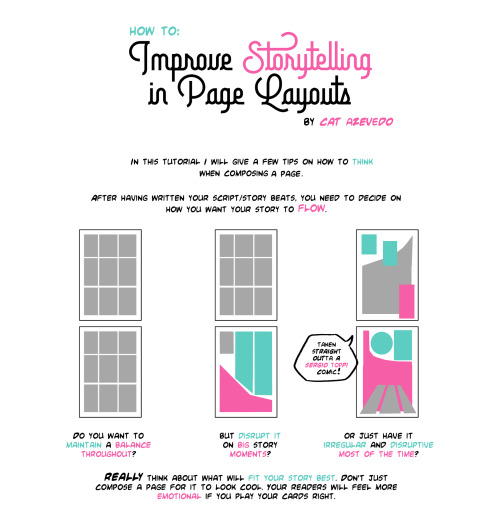
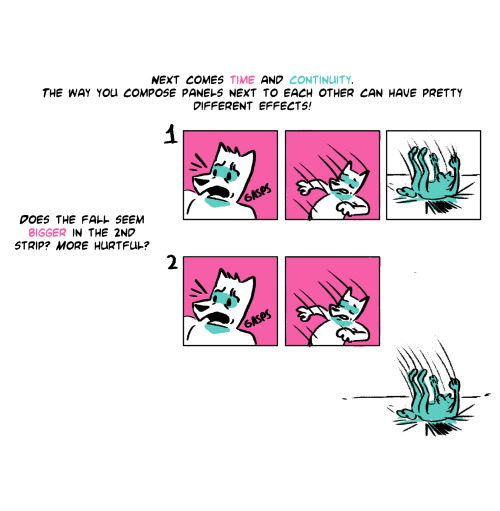
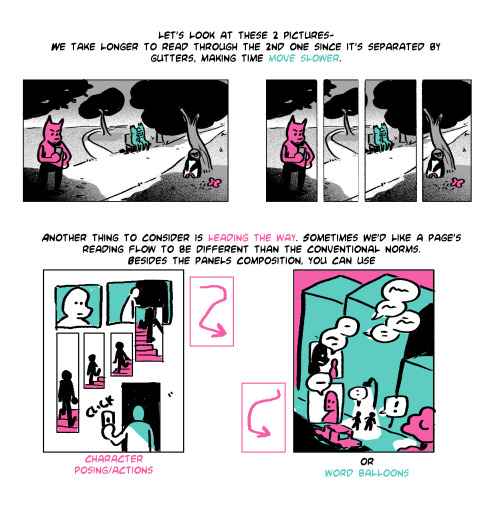

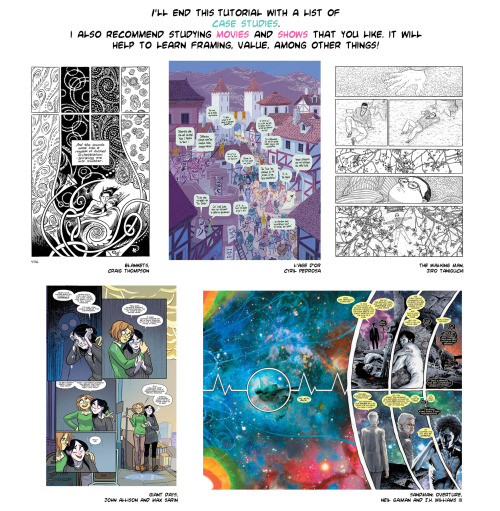
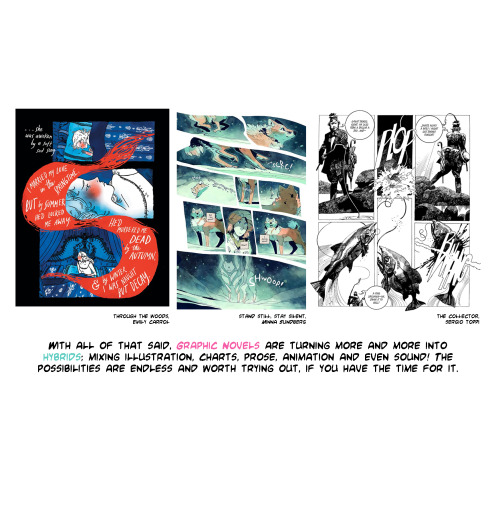
Did a small #tutorial for class on “How to Improve Storytelling in Panel Layouts”! Thought it might help some peepz around here!
How to end your story
Any way you want. The end.
Well, yeah, but in leu of some disappointing endings recently, let’s think a little bit more about it. Most simply:
Know your ending.
You have to know it. Figure it out when you’re plotting, or or in your first two drafts if your a pantser (like me). If you don’t know where your finish line is, you’re going to be running zigzags all over the place. Like I said: fine for a first draft, but once you’ve figured out ‘oh, this is how it ends’ then you can make a much straighter line from point A to point B.
This goes double if you’re writing a series. Yes, that means if your a pantser, you might have to write out the entire trilogy in its first-draft-entirety before you go back and start editing. Yes, that means if you’re a plotter you should probably plot out the entire series, at least loosely. It will be worth it. I think we’ve all ready a trilogy that has a huge amount of build up, only to be disappointed in the last book because there was no payoff.
Speaking of which:
Give the readers payoff.
If you’ve done nothing but talk about the great and terrible war that the characters have been preparing four books for, you should probably give them that great and terrible war.
OR, if you want to subvert your readers expectations, you need to give them something with equal pay off to it, that doesn’t come entirely out of left field. So if you want there to be a diplomatic solution to this war, it needs to be just as intense, breathtaking, and suspenseful as that battle would have been. Give us witty arguments, sudden allies being made, betrayals being felt, players rising and falling from power the same way they’d win or lose on the battlefield.
But if you just stop the battle from happening and everyone goes home? Then all of the readers’ excitement was for nothing. Their heart was pounding, their fingers shaking, riding that roller coaster going up only to find there is no drop, you just have to get off and walk down the stairs back to ground level. Disappointing.
Know who your characters become.
Just as important as plot pay off is character pay off. Have we seen the character go through 6 books of slow redemption? Have you been framing them as more and more relatable, have the readers been cheering on their improvements? Then maybe don’t have that character revert back to their old ways in the last ten pages of your final book (at least, not without warning-we’ll talk about that next).
Just like you should know the end of the plot from the beginning, you should know who the characters are going to end up as. Having big, important events shape your characters is good, but also important is the slow and steady changes that they’ll make over the course of the book or series. Not every character needs to change drastically from start to finish, but for those that do, have a clear image of who they become and how they’re going to get there. Again, the last ten pages isn’t the time for a sudden shift in character. Draw it out, don’t rush, and let them be true to who they are.
Foreshadowing.
Hints! Give the readers hints! Did they get the hints? Good! That means they like your book enough to read it carefully and analyze it! Don’t punish them for guessing right by changing your mind and dropping all the buildup to what you were foreshadowing.
Throw in cryptic prophecies. Give the characters dreams of the past they don’t want to talk about but will definitely come up later. Talk about past events that will mirror future events. But when you do this, know that you’re making a commitment. Once the clue is in there, it’s in there, and observant readers are going to take note. Especially if there are multiple clues to an event/reveal/etc., there really isn’t going to be a clean way to back out of it. Which, again, is why it’s so important to know your ending.
Tone.
Last but not least: decide what the tone of your ending will be. What’s the taste you want to leave in your readers’ mouths? Hopeful? Tragic? Warm and fuzzy? Unless this is what you’re explicitly going for, bitter probably doesn’t belong on the list. But bitter is what a lot of endings end up being, if they’re not thought through from the beginning.
Well, that’s all I’ve got. If anyone has any other ending advice, feel free to add it on.

